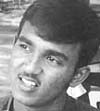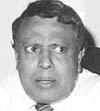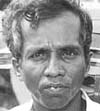 |
 26th July 1998 |
Front Page| |
|||||||
'South Asian something no?'Although Sri Lanka will host the 10th SAARC summit in Colombo this week, most people seem to be indifferent to the whole affair. By Ayesha R. Rafiq and Wathsala MendisAsk any six to sixty- year-old when Sri Lanka is playing her next cricket match and he will probably give you the correct answer without a moment's hesitation. He will also almost certainly know everything there is to know about the match. Who the players are, what are the countries involved, the biographies of the players, in short, anything even remotely connected with it, such is the interest. So one would naturally assume when an event of regional importance is about to take place, a majority of the people would be up to date with the facts connected with it. The 10th summit of the South Asian Association for Regional Co-operation (SAARC) will be held in Colombo at the Bandaranaike International Memorial Conference Hall( BMICH) from July 29 to 31. It will be attended by the heads of state of the seven SAARC countries, India, Pakistan, Nepal, Bhutan, Bangladesh, the Maldives and Sri Lanka. Preparations have been underway for the past three or four months with special committees being set up to see that everything goes smoothly. Money is being spent to spruce up Colombo and to ensure that the visiting delegates are comfortable. Security in the city will be stepped up, schools will be closed early, roads will be blocked, and in short, many people will be affected in one way or another. The layman assumes that many important decisions affecting him and his country will be taken. Given the importance of the event, it has been in the news during the past few weeks. Both the electronic and print media have been highlighting it and it would seem that by now most people would have a general idea of SAARC and its workings.
But when The Sunday Times went out on the streets to ask people their perceptions of SAARC, the attitude was one of indifference and apathy. We did a random survey of 50 people from different walks of life such as business people, company executives, school children, housewives, street vendors and so on, from districts such as Colombo, Matara, Matale, Galle, Kalutara, Vavuniya and Kandy. A majority of the people didn't even know what SAARC was. The answers to this question went something like "uh, South Asian something, no? Something about trade,no machang?" That Sri Lanka will be taking over the Presidency of SAARC for 1998/99, also mattered little to the majority of people we spoke to. Many seemed annoyed that at a time when the people are struggling to make ends meet such expenditure is being incurred. Many said that when they are trying to eke out an existence the last thing on their minds is the Summit. "We struggle to keep a roof over our heads and educate our children, and then we see so much money being spent on this. "It's such a waste," said one businessman. A company executive told us that he knows more about the European Union than SAARC because there is more information available in the media. Somewhere along the line there seems to be a breakdown in the chain of information and people seem little aware of the major issues discussed. Although the media is saturated with news about the event people say that it is not presented to them in a way that the common man can understand. "They use big words which we have never even heard of, so we get confused and ignore the news," is what one participant told us. The general perception is that important people will gather and settle issues to their satisfaction. Of the school children we interviewed, not even one of them could answer all six questions about SAARC correctly. Most could only name about three of the SAARC countries. One of them told us that the countries involved were China, Japan, the United Arab Emirates, Malaysia, Singapore and New Zealand! They explained to us that although they were taught about SAARC in the O/L classes by the time they came to the A/L's they had forgotten about it, because they felt it was not that important. One of the people we interviewed was a 19-year-old Head Prefect of a school in Colombo 3. These are his answers to the questions posed by us 1. What does SAARC stand for? 2. Can you name the countries in SAARC? 3. What is SAPTA? 4. Can you name the heads of state of the SAARC countries? 5. Where is the SAARC headquarters? 6. When was SAARC started? A trishaw driver told us that the only thing he knows about SAARC or any other important event, is that the roads are blocked, pavements are cleaned and new barricades are put up. Mothers we met complained that their children's schools were being closed early and that they were concerned the children would suffer as a result of school hours lost. The results of the poll:Only 26% knew what the letters SAARC stand for. More people named India as a member country than Sri Lanka, but only 17% could name all the seven member countries correctly. Only one-tenth of the people knew what SAPTA was. Only two percent could name the heads of state of Bhutan and Nepal. Two percent named all the heads of state correctly. Fourteen percent knew where the SAARC headquarters is located. Two percent of the people could name the year that SAARC started. Here are the correct answers to the six questions posed: 1. SAARC stands for the South Asian Association for Regional Co-operation. SAARC's laudable aims of fostering greater harmony and co-operation among people in the region will need to be reinforced to Sri Lankans if its message is to reach the people. |
|||||||||
 |
More Plus * Facing reality with sensitivity * Kala Korner * Book Shelf
Front Page| News/Comment| Editorial/Opinion| Business| Sports | Mirror Magazine |
||||||||
 |
Please send your comments and suggestions on this web site to |
||||||||






